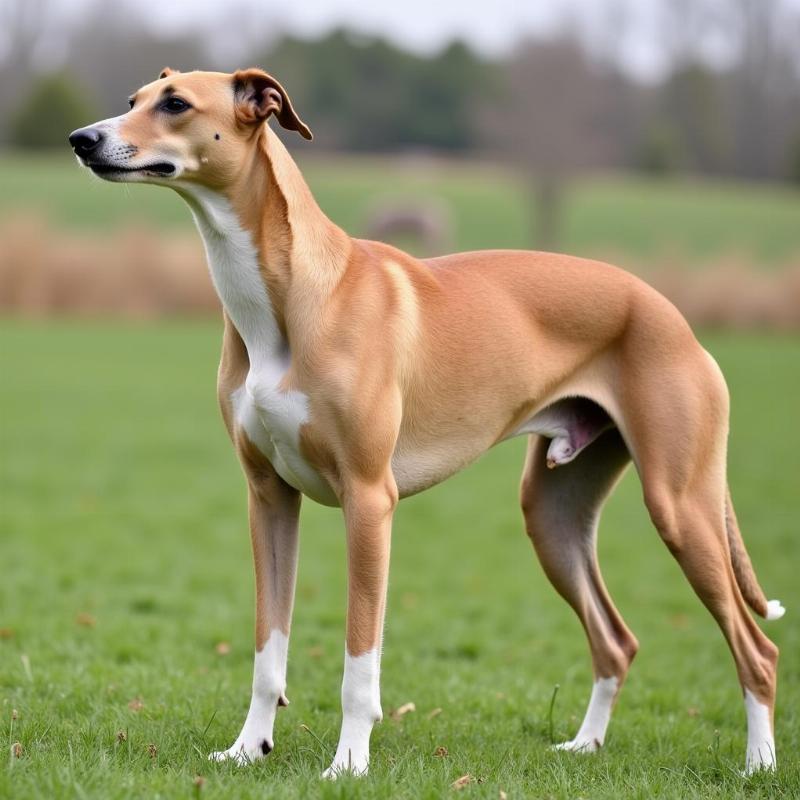Deep-chested and barrel-chested dogs often draw admiring glances, but these distinct thoracic conformations have significant implications for health and lifestyle. Understanding the difference between a deep chest and a barrel chest is crucial for responsible dog ownership, especially in breeds prone to specific health issues. This article will delve into the specifics of each chest type, exploring their characteristics, associated breeds, and potential health concerns relevant to dog owners in the United States.
What is a Deep Chest in Dogs?
A deep chest is characterized by a narrow but elongated rib cage that extends significantly down towards the elbows. This gives the dog a sleek, streamlined appearance. Think of a Greyhound or a Whippet – their deep chests contribute to their aerodynamic build, perfect for swift running. While aesthetically pleasing, this deep chest conformation can predispose certain breeds to a serious condition called Gastric Dilatation-Volvulus (GDV), commonly known as bloat.
 Greyhound with a Deep Chest
Greyhound with a Deep Chest
What is a Barrel Chest in Dogs?
A barrel chest, on the other hand, is round and wide, creating a more robust and stocky physique. This shape provides ample space for large lung capacity, which is advantageous for breeds originally bred for activities requiring endurance, like herding or pulling sleds. Breeds like Bulldogs and Corgis exemplify the barrel chest conformation. While generally healthy, a barrel chest can sometimes contribute to breathing difficulties, particularly in brachycephalic breeds (those with short noses and flat faces).
Deep Chest vs. Barrel Chest: Health Considerations
The distinct chest shapes are linked to different potential health concerns. Deep-chested dogs are at higher risk for GDV, a life-threatening condition where the stomach twists, cutting off blood supply. This is more common in large, deep-chested breeds and requires immediate veterinary attention.
Barrel-chested dogs, while less prone to GDV, may experience breathing difficulties, especially if they are also brachycephalic. The combination of a barrel chest and a short snout can restrict airflow, leading to respiratory distress.
Which Breeds Have Deep Chests?
Deep-chested breeds commonly seen in the US include Great Danes, Irish Wolfhounds, Doberman Pinschers, and German Shepherds. These breeds benefit from regular veterinary checkups to monitor for any signs of GDV and adherence to preventative measures recommended by the American Kennel Club and local veterinarians.
Which Breeds Have Barrel Chests?
Common barrel-chested breeds in the US include Bulldogs, French Bulldogs, Corgis, and English Bulldogs. For these breeds, especially the brachycephalic ones, monitoring respiratory health is important. Consulting with a veterinarian about maintaining a healthy weight and managing any breathing issues is crucial.
Living with a Deep or Barrel-Chested Dog
Whether you share your life with a deep-chested or barrel-chested dog, understanding their specific needs is paramount. For deep-chested dogs, feeding smaller, more frequent meals and avoiding strenuous exercise after eating can help minimize the risk of GDV. For barrel-chested dogs, especially brachycephalic breeds, providing a cool, comfortable environment and avoiding strenuous activity in hot weather can help prevent respiratory distress.
Conclusion
Recognizing the difference between a deep chest and a barrel chest is more than just appreciating the diversity of canine morphology. It’s about understanding the potential health implications associated with each chest type and tailoring your care accordingly. By staying informed and proactive, you can ensure your canine companion enjoys a long, healthy, and happy life. Remember to consult with your veterinarian for personalized advice based on your dog’s breed and individual needs.
FAQ
- What is the biggest health concern for deep-chested dogs? Gastric Dilatation-Volvulus (GDV), or bloat, is a major concern.
- Are barrel-chested dogs prone to bloat? While less common than in deep-chested dogs, bloat can still occur.
- What can I do to prevent bloat in my deep-chested dog? Feed smaller, more frequent meals, avoid strenuous exercise after eating, and consult your veterinarian about preventative measures.
- What are the breathing concerns for barrel-chested dogs? Brachycephalic breeds with barrel chests can experience restricted airflow.
- How can I help my barrel-chested dog breathe easier? Maintain a cool environment, avoid strenuous activity in hot weather, and consult your veterinarian.
- What are some examples of deep-chested dog breeds? Great Danes, Irish Wolfhounds, Doberman Pinschers, and German Shepherds.
- What are some examples of barrel-chested dog breeds? Bulldogs, French Bulldogs, Corgis, and English Bulldogs.
Beautdogs.us is your premier source for all things dog-related in the United States. We offer expert advice on dog breeds, care, and products, catering to both novice and experienced dog owners. From understanding the nuances of deep chest vs. barrel chest to finding the perfect products for your furry friend, Beautdogs.us is your trusted companion on this journey. Contact us today for personalized guidance! Email: [email protected], Phone: +1 501-555-7529.